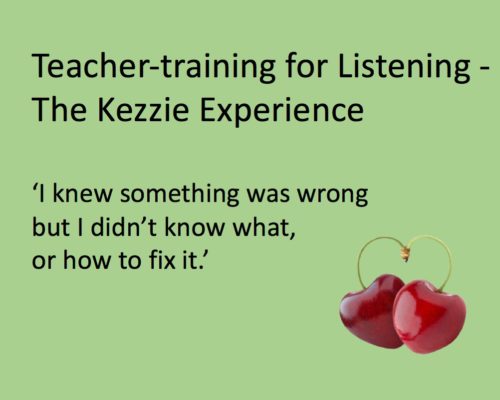Listening Cherry 26 – Teacher training for listening – the Kezzie experience
It took me until 1990, twelve years into my teaching career (yes, I’m well into my fourth decade now), before I realised that native speaker teachers such as myself are deaf to what is really going on in the sound substance of speech (that’s bad); that as a result we are unable to teach our students how to decode the stream of speech (that’s worse); and if we follow conventional methodology, we behave as if we do not need to (worst). Fortunately, it seems, some younger teachers are learning to teach decoding somewhat earlier in their careers than I did.
At the 2016 IATEFL conference, Richard Chinn and Marie Willoughby – teacher-trainers at International House London – quoted a colleague, Kenzie Moynihan, talking about her unease about the teaching of listening:
I knew something was wrong but I didn’t know what, or how to fix it. (Chinn & Willoughby 2016)
This expression of unease brought back memories of my own unease that started very early in my teaching career. (I started in Hong Kong in 1979).
This discomfort was exacerbated over the years by the writings and conference presentations of ELT experts. The most notable of these was a conference presentation advertised as ‘The What of Listening’ – and the presenter began by saying ‘The What of listening is important, but not as important as the How’ – and he proceeded to focus entirely on ‘How’ of conventional testing-understanding methodology.
Back to the present day. I have subsequently communicated with Kezzie (the teacher-trainee quoted above) and asked her about her experiences. She told me that everything changed for her when she was doing her DELTA course (a training course for experienced teachers).
The thing that specifically made me think more critically about listening tasks was a decoding input session, in which we examined a Scottish person’s accent. This was then compared with a normal comprehension task … the stark contrast between the two helped to show me that I had been right in thinking that normal top-down processing isn’t always going to help students improve their listening skills, as it hadn’t helped us when we’d listen to a series of unintelligible accents, and we were native speakers!
The crucial point here is highlighted in bold – the normal comprehension task had not helped her (a native speaker) get to grips with a different accent of English.
Kezzie goes on to say that she subsequently used decoding activities in her own classes, and has had ‘overwhelmingly more positive feedback’ from students. And the good thing is (NB not the best thing as you will see below) she writes
Even the students who don’t feel like they did well in class have often said that later they have recognised some elision or a combined sound that we focused on in class.
(In passing we should note that this remark shows that students can and do learn without feeling that they are doing well: discomfort and frustration are often important feelings in the learning process cf. Cauldwell, 2002, available here)
So what’s the best thing? Well, the best-best thing is that Kezzie, Richard and Marie and their colleagues are now incorporating decoding activities into their initial teacher training courses, the CELTA. So these beginning teachers won’t have to wait twelve years for their enlightenment (or perhaps that word should be ‘en-sound-en-ment’) as I did.
Acknowledgements: Thanks to Richard Chinn, Marie Willoughby, Kezzie Moynihan and last (but foremost) Melissa Lamb who let me observe her input session to CELTA trainees at IH in London.
Cauldwell, R. (2002). Grasping the nettle: the importance of perception work in listening comprehension. Available here.
Chinn, R. & Willoughby, M. (2016). ‘The gap’ – training teachers to develop learners’ listening skills. Conference. IATEFL 2016.



Leave a Reply